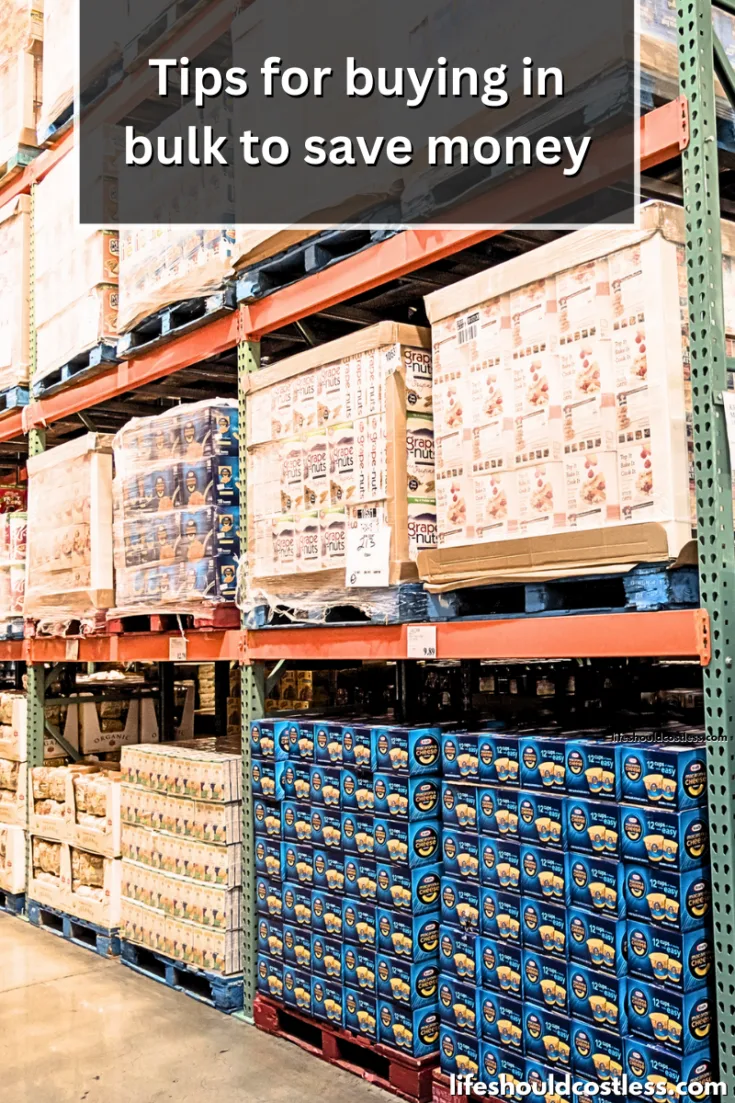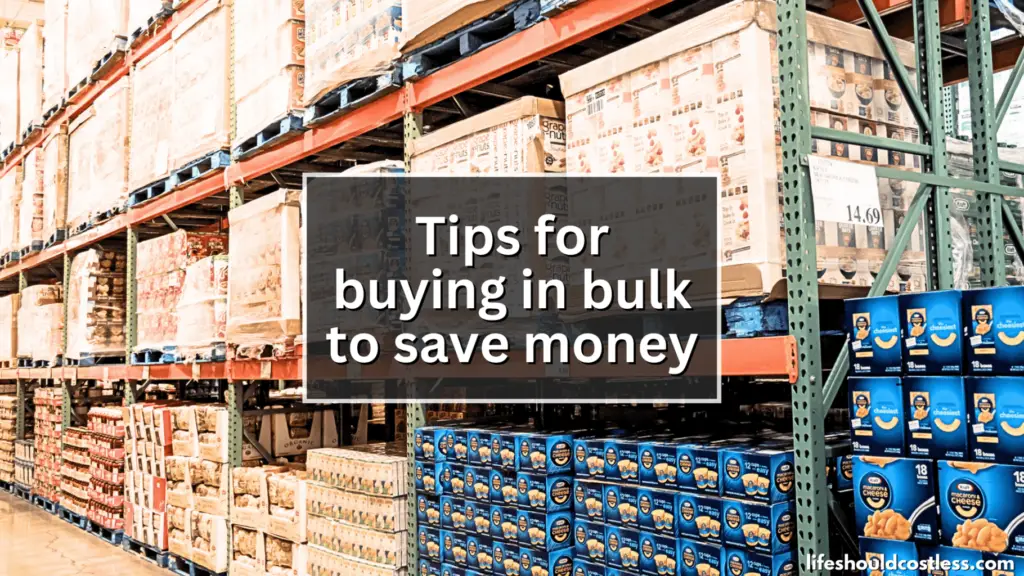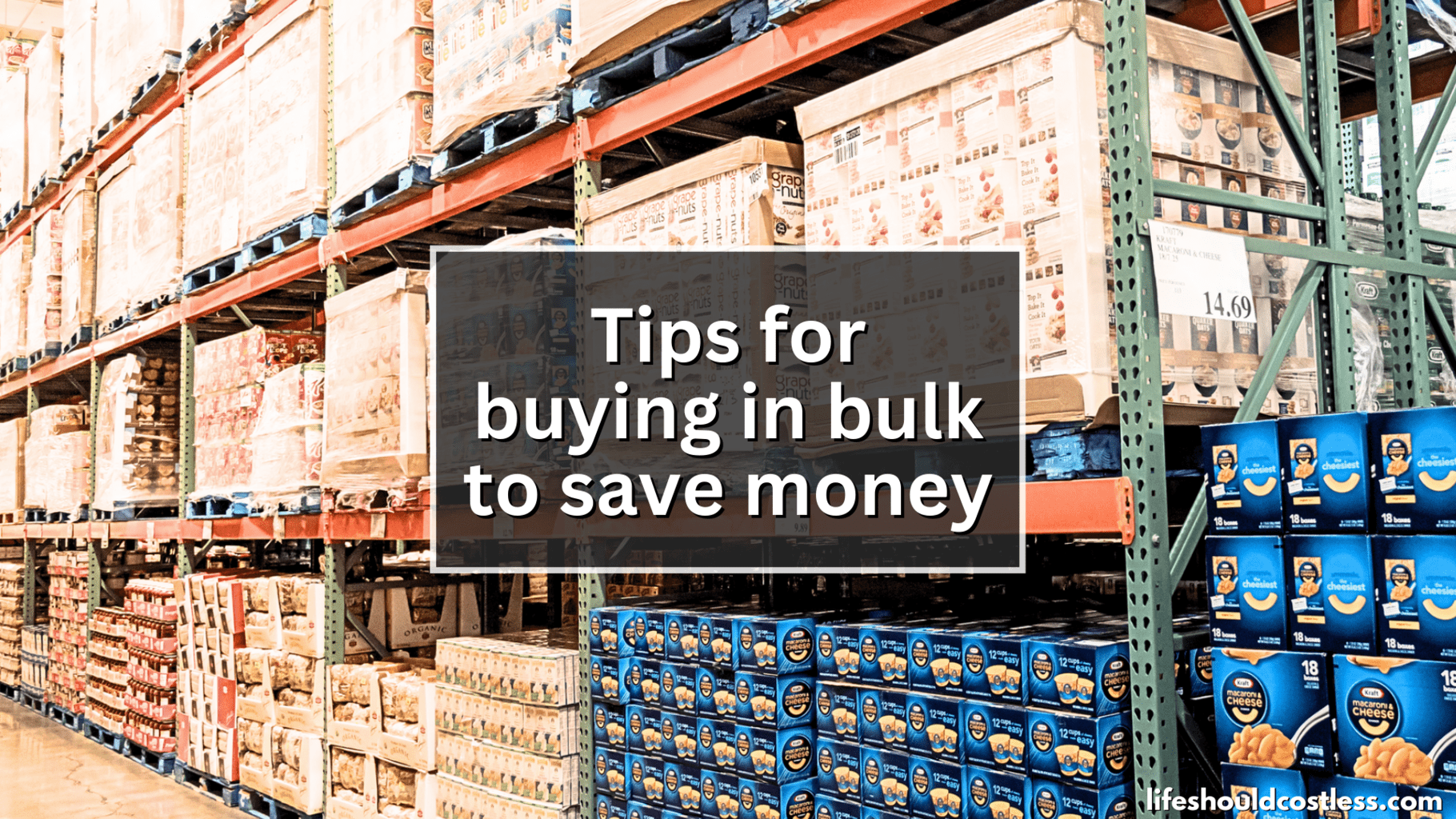Introduction
Welcome to The Frugal Shopper’s Guide to Buying in Bulk! In this guide, I will share valuable tips and strategies on how to save money on everyday essentials by purchasing in bulk. Buying in bulk is a tried-and-true method for frugal individuals who want to make the most of every dollar. By purchasing larger quantities of items at once, you can enjoy significant savings in the long run.
Benefits of Buying in Bulk
One of the greatest advantages of buying in bulk is the cost savings. Purchasing products in larger quantities often allows you to take advantage of lower unit prices compared to buying smaller quantities. This can add up to substantial savings over time, especially for items you frequently use. Additionally, buying in bulk reduces the need for frequent shopping trips, saving you time and even transportation costs.
Key Considerations
Before diving into bulk buying, it’s important to consider a few key factors. First, assess your storage space. Buying in bulk means you’ll need adequate room to store the larger quantities of items. Ensure that you have enough space to accommodate the products you plan to purchase.
Next, take note of expiration dates. While buying in bulk can be cost-effective, it’s crucial to prioritize using products before they expire. Carefully check the expiration dates on items to avoid wastage and ensure that you’ll be able to consume or utilize them in a reasonable amount of time.
What to Buy in Bulk
Certain items lend themselves well to bulk purchasing. Non-perishable items such as canned goods, grains, and toiletries are excellent choices. Cleaning supplies, paper products, and pet supplies are often more economical when purchased in larger quantities as well.
In contrast, perishable items like fresh produce and dairy have a limited shelf life, making them less suitable for bulk purchases. It’s essential to strike a balance by buying perishable items in bulk only if you can consume or freeze them before they spoil.
Understanding the Concept of Buying in Bulk
Buying in bulk is a smart and practical way to save money on everyday essentials. By purchasing larger quantities of items that you frequently use, you can take advantage of discounted prices and reduce the cost per unit. The benefits of buying in bulk are numerous and can have a significant impact on your budget.
First and foremost, buying in bulk allows you to save money. Many retailers offer lower prices for bulk purchases since they can pass on the cost savings they achieve from buying in large quantities. When you buy in bulk, you can often secure prices that are considerably lower than what you would pay for individual items. This can result in substantial savings over time, especially if you frequently use certain products.
In addition to saving money, buying in bulk also saves you time and reduces the number of shopping trips you need to make. By stocking up on essential items, you can avoid frequent trips to the store, saving you both time and transportation costs. This is especially beneficial for items that have a long shelf life or that you use frequently, such as household cleaning supplies, toiletries, and non-perishable food items.
Factors to Consider before Buying in Bulk
While buying in bulk offers numerous benefits, there are a few factors to consider before diving in. Firstly, it’s important to evaluate your storage space. Buying in bulk means acquiring larger quantities of items, so make sure you have enough space to store them properly. Assess your pantry, cabinets, and other storage areas to ensure you can accommodate the increased quantity of items.
Another factor to consider is product quality and expiration dates. Before buying in bulk, check the expiration dates on the products you are considering. While certain items have a long shelf life, others may expire sooner than expected. It’s essential to only purchase what you can consume before it expires to avoid wastage.
Lastly, it’s crucial to compare prices and do your research before committing to buying in bulk. While it’s often cheaper to purchase in bulk, this is not always the case. Compare prices at different retailers and calculate the cost per unit to determine if the bulk purchase truly offers savings. Additionally, consider joining warehouse clubs or shopping online as they often provide exclusive deals and discounts for bulk purchases.
understanding the concept of buying in bulk and its associated benefits can greatly contribute to saving money on everyday essentials. Before diving into bulk purchases, consider factors such as storage space, product quality, expiration dates, and price comparisons to ensure it aligns with your needs and preferences. By making informed decisions, you can reap the financial benefits of buying in bulk while ensuring you are only purchasing what you need and can use.
Planning Your Bulk Shopping
When it comes to saving money on everyday essentials, buying in bulk can be a game-changer. But before you start filling up your shopping cart with jumbo packs and super-sized containers, it’s important to have a plan in place. In this section, I’ll guide you through the necessary steps to ensure that your bulk shopping experience is successful and cost-effective.
Creating a Shopping List
Before heading out to the store, take some time to create a detailed shopping list. Consider the items you use frequently and would benefit from buying in larger quantities. Include items such as non-perishable food items, cleaning supplies, toiletries, and pet essentials. By having a well-thought-out list, you can avoid impulse purchases and stay focused on what you actually need.
Calculating Quantity Needed
Next, you’ll want to determine the quantity of each item you require. Take into account how quickly you consume or use each product and how long it typically lasts. For example, if your family goes through a box of cereal every week, you may want to stock up on a month’s worth of cereal to maximize your savings. Additionally, consider the expiration dates of perishable items and make sure that you can reasonably consume them before they go bad.
Determining Storage Space
One important aspect of buying in bulk is ensuring that you have enough storage space to accommodate your purchases. Take stock of your pantry, cabinets, and any additional storage areas. Measure the available space and plan accordingly. This step will prevent you from buying more than you can store and help you organize your bulk purchases effectively.
By planning your bulk shopping in advance, you can save both time and money. A well-organized shopping list, an understanding of the quantity you need, and a consideration of your storage space are crucial elements for a successful bulk shopping experience. So, get ready to stock up on your everyday essentials and enjoy the savings!

Finding Bulk Buying Opportunities
Local Wholesale Stores
One of the easiest ways to save money in the frugal shopper’s journey is to opt for buying in bulk. But where can you find these amazing bulk buying opportunities? Well, look no further than your local wholesale stores. These stores are specifically designed to cater to bulk buyers and offer a wide range of everyday essentials at discounted prices. From groceries to household items, you can find everything you need in large quantities. Visit some popular ones like Costco, Sam’s Club, or BJ’s Wholesale Club, and explore their aisles filled with incredible deals.
Online Wholesale Platforms
In the digital age, buying in bulk has become even more convenient with online wholesale platforms. These platforms provide an extensive selection of products at wholesale prices delivered right to your doorstep. Websites like Amazon Business, Boxed, and Alibaba are just a few examples of the numerous online platforms available. You can browse through their product categories, compare prices, and read reviews before making your purchase. Online shopping not only saves you time and effort but also allows for easy price comparison to ensure you’re getting the best deal.
Buying Clubs
Joining a buying club is another excellent way to access bulk buying opportunities and maximize your savings. These clubs consist of a group of individuals who pool their resources and buy products in bulk directly from manufacturers or distributors. By cutting out the middleman, buying clubs can offer their members significant discounts. Look for local buying clubs in your community and inquire about membership details. Not only will you enjoy exclusive bulk buying deals, but you’ll also be a part of a community that shares your frugal mindset.
Incorporating these strategies into your frugal shopping routine opens up a world of money-saving possibilities. Whether you choose to explore local wholesale stores, utilize online wholesale platforms, or join a buying club, take advantage of bulk buying opportunities and watch your savings grow. So, don’t delay – start incorporating these tips into your shopping routine and enjoy the benefits of buying in bulk.

Comparing Prices and Quality
Researching Price Variations
When it comes to buying in bulk, one of the most crucial steps is comparing prices. Not all stores offer the same deals, so taking the time to research price variations can save you a significant amount of money. I usually begin by checking prices at different grocery stores, both local and online. Many online retailers offer bulk items at discounted rates, so don’t forget to consider them as well.
Furthermore, it’s important to keep an eye on promotions and sales. Stores often have regular discount events or offer coupons for specific products. Signing up for newsletters or following retailers on social media can help you stay updated on these deals. Additionally, comparing prices with wholesale clubs or warehouse stores can provide substantial savings, as they typically sell items in larger quantities.
Evaluating Product Quality
While saving money is essential, it’s equally important to ensure the quality of the products you’re purchasing in bulk. Nobody wants to end up with a heap of low-quality items. To evaluate the product quality, I always read reviews from other shoppers. Online platforms and social media are excellent resources to discover others’ experiences with certain products.
Another method I use is trying out samples before committing to a bulk purchase. Some stores offer sample sizes or trial packs that allow you to test the product before making a larger investment. This way, you can see if the quality meets your expectations and avoid any disappointments.
comparing prices and evaluating product quality are vital aspects of buying in bulk. By researching price variations and considering discounts, promotions, and wholesale alternatives, you can save a substantial amount of money. However, don’t forget to check reviews and try out samples to ensure the products meet your quality standards. So, the next time you’re stepping into the world of bulk shopping, make sure you’re armed with these valuable tools to become a frugal shopping pro!

Calculating Cost Savings
Understanding Unit Prices
When it comes to buying in bulk, understanding unit prices is essential for any frugal shopper. Unit prices allow you to compare the cost of different sizes or quantities of a product, helping you determine the best value for your money. So the first step before making a bulk purchase is to calculate the unit price.
To calculate the unit price, simply divide the total cost of the item by the quantity or size. For example, if a pack of 10 toothbrushes cost $8, the unit price would be $0.80 per toothbrush. By comparing unit prices, you can easily identify which bulk option offers the most savings. Remember, though, that unit prices may vary between brands or retailers, so it’s important to compare prices to ensure you’re getting the best deal possible.
Tracking Expense Reductions
One of the key benefits of buying in bulk is the potential for significant cost savings over time. To see these savings add up, it’s important to keep track of your expenses. Create a simple spreadsheet or use a budgeting app to record the prices and quantities of the products you buy in bulk. This will help you monitor your monthly or yearly savings and evaluate the effectiveness of your bulk purchasing strategy.
By tracking your expenses, you’ll begin to notice patterns and trends, allowing you to make more informed decisions about when and how to buy in bulk. You may find that certain products are consistently cheaper at specific times or during certain promotions. With this knowledge, you can plan your bulk purchases strategically to maximize your savings.
Remember, buying in bulk is not about mindlessly stocking up on everything, but rather about being intentional and mindful of your purchases. By understanding unit prices and tracking your expenses, you’ll be able to make informed decisions that save you money on everyday essentials.
So why not give it a try? Start calculating your unit prices and tracking your expense reductions today, and you’ll be well on your way to becoming a savvy and frugal shopper.

Storage and Organization Tips
As a frugal shopper, buying in bulk can be an effective way to save money on everyday essentials. However, it is important to have a plan for storing and organizing your bulk purchases to ensure they last and are easily accessible. In this section, I will share some valuable tips on storage and organization that will help you make the most of your bulk purchases.
Proper Storage Methods
One of the key aspects of buying in bulk is ensuring proper storage to maintain the quality and freshness of your items. When it comes to perishable goods such as fruits, vegetables, and dairy products, investing in airtight containers or resealable bags can significantly extend their shelf life. It is also crucial to store these items in a cool and dry place, away from direct sunlight or heat sources.
For non-perishable items like canned goods, pasta, and rice, utilizing sturdy and stackable bins or containers can help maximize your storage space. Keep in mind that it is essential to store these items in a clean and organized manner, following the first-in-first-out principle to prevent any waste or expiration.
Labeling and Rotation Systems
To maintain an organized bulk pantry, implementing labeling and rotation systems can save you time and money. Labeling each container or bin with its contents and the purchase date can help you identify items quickly and keep track of their freshness. Additionally, using color-coded labels or markers can further enhance the organization, making it easier to spot specific categories or expiration dates.
Implementing a rotation system is equally important to ensure the consumption of items before they expire. By placing newly purchased items behind older ones, you are more likely to use them in a timely manner, avoiding waste and maximizing your savings.
By following these storage and organization tips, you can maintain the quality of your bulk purchases and keep your pantry efficient and cost-effective. With a well-organized system in place, you will always have what you need on hand and be well-prepared to take advantage of the savings that come with bulk buying.

Avoiding Waste and Spoilage
One of the biggest concerns when buying in bulk is the potential for waste and spoilage. Nobody wants to spend their hard-earned money on a big bag of rice or a whole carton of milk, only to have it go bad before it can all be consumed. Luckily, there are some simple strategies you can use to minimize waste and make the most of your bulk purchases.
Smart Expiration Date Management
When buying in bulk, it’s important to pay attention to expiration dates. Some products, like canned goods or dry pasta, have a long shelf life and can be purchased in large quantities without worry. However, other items, such as fresh produce or dairy products, have a shorter lifespan and require more careful management.
To make the most of your purchases, always check the expiration dates before buying in bulk. Try to choose items with later expiration dates, ensuring that you have enough time to consume them before they go bad. Additionally, it’s crucial to rotate your stock and use the oldest items first. This way, you can prevent any items from being forgotten or left to spoil.
Preserving Perishable Items
To extend the shelf life of perishable items, consider various preservation techniques. Freezing fruits and vegetables is a great way to make them last longer. You can wash, chop, and store them in portion-sized freezer bags for easy use in future meals. Similarly, dairy products like butter and cheese can be frozen for later use.
Another useful method is canning, which involves preserving food in airtight jars through processes like boiling or pressure cooking. Canned foods can last for months or even years, making them an excellent option for long-term storage.
By employing smart expiration date management and exploring preservation techniques, you can avoid waste and spoilage when buying in bulk. With some careful planning and a little creativity, you’ll be able to maximize your savings and enjoy the convenience of having everyday essentials readily available. Remember, the key is to be mindful of what you’re buying and how long it will last, ultimately ensuring that your bulk purchases are both frugal and practical.
Managing a Bulk Shopping List
Updating Inventory
One of the keys to successfully buying in bulk is effectively managing your shopping list. To do this, it’s important to regularly update your inventory. This means taking stock of what you already have on hand before heading out to make your bulk purchases. By knowing exactly what items you have in stock, you can avoid buying unnecessary duplicates and ensure that you’re only purchasing what you truly need.
To update your inventory, start by taking a thorough inventory of your pantry, fridge, and other storage areas. Make a list of the items you currently have and note down their quantities. Consider organizing your list by categories such as pantry staples, toiletries, cleaning supplies, and so on. This will make it easier to identify what items you need to restock.
Replenishing Supplies
Once you have your updated inventory list, you can easily determine which supplies need to be replenished. Keep in mind that buying in bulk means purchasing larger quantities of items, so it’s important to accurately gauge how much you actually need. Consider factors like product shelf life, consumption frequency, and storage space.
When replenishing your supplies, prioritize the items you use most frequently and those that have shorter expiration dates. This will help you avoid waste and ensure that you’re always well-stocked on essentials. Additionally, take note of any items that are on sale or offered at discounted prices. Buying in bulk when there are deals available can lead to even greater savings.
By regularly updating your inventory and replenishing your supplies, you can maintain a well-organized and cost-effective system for buying in bulk. It takes a little effort and planning upfront, but the savings and convenience that come from efficiently managing your bulk shopping list are worth it. So start taking control of your shopping list today and make the most of your frugal buying habits.
Bulk Buying for Non-Perishable Items
Toiletries and Personal Care Products
When it comes to stocking up on toiletries and personal care products, buying in bulk can lead to significant savings. Items like toilet paper, shampoo, toothpaste, and soap are non-perishable, which means they have a long shelf life. By purchasing these essentials in bulk, you’ll not only save money, but also reduce the frequency of trips to the store.
For toiletries, consider purchasing a bulk package of toilet paper that will last you several months. This way, you won’t have to worry about running out every few weeks. Additionally, buying shampoo and conditioner in larger bottles will save you money in the long run, as they tend to cost less per ounce.
Cleaning Supplies and Household Items
When it comes to cleaning supplies and household items, buying in bulk can be a game-changer. Stock up on items such as laundry detergent, dish soap, and paper towels. These products are non-perishable and will always come in handy. Buying them in bulk quantities will not only save you money, but also ensure that you never run out when you need them the most.
Consider investing in a large container of laundry detergent. This way, you won’t have to worry about buying small bottles every few weeks, and you’ll be prepared for any stain or spill that comes your way. Additionally, purchasing paper towels in bulk will save you from constantly running to the store when you run out.
Buying in bulk for non-perishable items is a fantastic way to save money on everyday essentials. By ensuring that you have a stock of toiletries and personal care products, as well as cleaning supplies and household items, you can limit your trips to the store and take advantage of better prices. Embrace the frugal shopper within you, and start buying in bulk today. It’s a win-win situation for your wallet and your peace of mind. In my quest to live a frugal lifestyle, one of the most effective ways I have found to save money is by buying in bulk. Not only does it help me save a significant amount of money, but it also allows me to stock up on everyday essentials, ensuring that I never run out of the items my household needs.
Fruits and Vegetables
When it comes to buying perishable items like fruits and vegetables in bulk, it’s important to have a plan in place to prevent them from going bad before you can consume them. One strategy that has worked well for me is to buy ripe fruits that can be eaten right away, while also purchasing slightly underripe ones that can be enjoyed later in the week. It’s also helpful to portion and freeze some vegetables for future use in soups, stir-fries, and smoothies. By doing so, I can take advantage of bulk discounts without the worry of waste.
Meat and Poultry
Buying meat and poultry in bulk can be a fantastic way to save money, especially if you have a large freezer or access to a local butcher. One option is to purchase larger cuts of meat, such as whole chickens or roasts, and then portion them into smaller sizes before freezing. Another approach is to join a meat share or community-supported agriculture (CSA) program. These initiatives allow you to purchase meat directly from local farmers, often at a lower cost than what you would find at the grocery store.
Dairy and Frozen Goods
When it comes to dairy and frozen goods, buying in bulk can be a convenient way to ensure you always have these essentials on hand. Consider purchasing larger containers of milk, yogurt, and cheese, and then portioning them into smaller sizes or freezing them for later use. As for frozen goods, stocking up on items like vegetables, fruits, and frozen meat can be a great way to save both time and money. Just make sure you have enough freezer space to accommodate your purchases.
By incorporating bulk buying into your frugal lifestyle, you can save both time and money. Whether it’s purchasing perishable items like fruits and vegetables, meat and poultry, or dairy and frozen goods, having a plan in place is crucial. So go ahead and stock up on these everyday essentials and enjoy the savings they bring.
Conclusion
In conclusion, buying in bulk is a smart and frugal way to save money on your everyday essentials. By purchasing larger quantities of products, you can take advantage of lower unit prices and reduce your overall spending. Buying in bulk is particularly beneficial for items that you use frequently, such as toiletries, cleaning supplies, and non-perishable food items. It allows you to stock up on these essentials in larger quantities, ensuring that you always have them on hand and eliminating the need for frequent trips to the store.
Tips for Successful Bulk Shopping
To make the most of your bulk shopping experience, it’s important to follow a few key tips. First and foremost, be sure to compare prices and calculate the unit prices of different bulk options. This will help you determine whether you’re actually getting a good deal or if it’s cheaper to purchase smaller quantities. Additionally, take into account your storage space and expiration dates before buying in bulk. Make sure you have enough room to store the products and that they won’t go bad before you can use them up.
Choosing the Right Store
When it comes to buying in bulk, not all stores are created equal. Warehouse clubs like Costco and Sam’s Club are popular options for bulk shopping, offering a wide variety of products at discounted prices. However, don’t overlook other options such as online retailers and local co-ops. These alternatives can also provide great deals and a more convenient shopping experience, especially if you don’t have a membership to a warehouse club.
Final Thoughts
In conclusion, buying in bulk is a valuable strategy for frugal shoppers looking to save money on everyday essentials. By taking advantage of lower unit prices and stocking up on the items you regularly use, you can keep more money in your wallet in the long run. Just be sure to compare prices, consider storage and expiration dates, and choose the right store for your bulk shopping needs. Happy savings!

